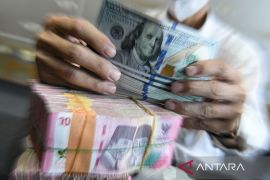Export performance was expected to remain solid amid strong demand and high prices in the global market, head of the central bank`s public relations bureau Difi A Johansyah said here on Thursday.
Imports were projected to grow at a high pace thanks to strong domestic demand for oils, raw materials and capital goods, he said.
On the capital and financial transaction side, foreign capital inflows including foreign direct investment (FDI) and portfolio investment would hopefully remain high, he said.
He said the country`s foreign exchange reserves in the year ended April 30, 2011 stood at US$113.8 billion enough to finance imports and government debt repayments for 6.7 months.
With the strong foreign capital inflows, the rupiah`s exchange rate against the dollar strengthened 1.6 percentage points to Rp8,564 per dollar, with volatility kept under control, he said.
He noted that the rupiah`s strengthening was inseparable from investors` positive perception of the country`s solid economic fundamentals.
The central bank saw the movement of the rupiah`s exchange rate was still relevant to its effort to stem inflationary pressures and maintain economic growth momentum, he said.
So far, the rupiah`s appreciation had had no negative impact on the competitive edge of domestic products and that the export performance would remain strong, he said.
On the price side, although the consumer price index (IHK) in April recorded another deflation, Bank Indonesia predicted that inflationary pressure risk in the future would remain high, he said.
The IHK inflation reached 6.16 percent year-on-year in April, down 0.31 percent following a drop in commodity prices thanks to the government`s steps to deal with disruptions of staple food supplies.
Yet volatile food inflation was still relatively high. On the other hand, core inflation, which leaves out volatile food and fuel prices showed an upward trend.
In April core inflation accelerated to 4.62 percent year-on-year or 0.25 percent month-on-month. The upward trend in core inflationary pressure was among others fueled by a rise in global commodity prices, high inflation expectation and rising demand.
Looking ahead, the central bank would always keep watch for several risk factors that might raise inflationary pressures, including those originating from the high global commodity prices, strong demand, and the government`s policy related to fuel oil subsidy, he said. (*)
Editor: Kunto Wibisono
Copyright © ANTARA 2011











